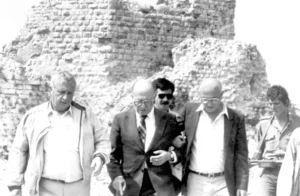MIDDLE ISRAEL: 40 years after Israel’s most failed war, its leaders seem to have learned its lessons – except one lesson, and one leader.

They expected a cakewalk. Equipped with vast fleets of ultramodern fighter jets, battle tanks and artillery batteries, all manned by thousands of well-trained troops and commanders, Israel’s leaders set out to invade their weakest, but most annoying, neighbor: Lebanon.
The cause, the emergence in southern Lebanon of a Palestinian army that fired rockets at the Upper Galilee, was unimpeachable. The plan, however, was a hodgepodge of adventurism, ignorance and conceit that produced Israel’s most failed war.
Now, as the First Lebanon War turns 40, it seems Israeli leaders have learned all its lessons; all, that is, except one lesson, and one leader.
The mistakes
THE FIRST of the war’s four big mistakes lay in its political dimension, the quest to decide the Lebanese Civil War and crown a government that would make peace with the Jewish state.
The war’s planners lumped together “the Muslims,” failing to evaluate the Shi’ites’ communal distinction, demographic momentum, Iranian backing and religious zeal. At the same time, they overlooked the Christians’ steady demographic shrinkage and political decline.
Instead of peace, Israel got entangled in Lebanon’s tribal maze, and thus learned it was in no position to shape an Arab country’s internal affairs.
The second big mistake was on the war’s military side.
Israel had previously fought conventional armies and terrorist organizations, but in Lebanon it entered a guerrilla war for which it had not prepared. The failure to assess the Shi’ites’ motivation and abilities led Israel’s leaders to expect a quick war and reap a huge political windfall.
It was the same illusion with which Germany triggered World War I in summer 1914, expecting the fighting to end by Christmas, and the same illusion that drove this year’s Russian invasion of Ukraine. And so, what was initially described as “a 48-hour incursion” lasted 17 years and cost more than 1,000 Israeli lives.
The war’s third grand mistake was economic.
Convinced the war would be short and that it would generate an economically stimulating peace with Lebanon, Israel assumed the war’s bill was peanuts. Instead, it demanded much weaponry and construction as well as thousands of reservists, whose deployment cost thousands of civilian workdays.
The result was an already high inflation’s acceleration, thus fanning hyperinflation and sparking a stock market collapse the year after the invasion, which in turn triggered the commercial banks’ collapse and nationalization, and the near extinction of Israel’s foreign currency reserves by 1985.
Fortunately, all these three mistakes’ lessons have been learned.
Politically, Israel has quietly abandoned the business of interfering in other people’s wars, an attitude that is now visible in multiple theaters, from Syria and Yemen to Libya and Ukraine.
Militarily, Israel has shunned the adventurism that drove its leaders in 1982. And economically, Israel’s fiscal conduct – following the 1985 reforms that partly resulted from the war – has become a celebration of discipline and prudence, especially when compared with the rest of the developed world.
That cannot be said of the First Lebanon War’s fourth mistake, the misreading of Israeli society.
What wasn’t learned
WARS NEED consensus. It’s basic, and Israel’s leaders in 1982, having lived during the Vietnam War, should have known this.
Modern wars are also scrutinized by television and the rest of the media in ways that Israel’s leaders those days did not appreciate. In Israel’s previous wars there was a broad consensus that the wars were imposed on Israel by its enemies.
In 1982, prime minister Menachem Begin said for the record that what he launched was “a war of choice.” That demanded even more consensus. Alas, the consensus was hardly three months old when it fell apart.
What began with hundreds of casualties on the battlefield was soon followed by the assassination of Israel’s ally, president-elect Bachir Gemayel; his followers’ massacring of innocent Palestinians, and the collapse, less than two months later, of a building in Tyre, in which 76 Israelis and 15 Lebanese were killed.
This early chain of debacles convinced a critical mass of the public that the government’s plan was unworkable and that its ally was immoral, disloyal and weak. And then came the guerrilla war, underscored by a suicide bombing in Tyre in November 1983, which killed 28 Israelis and 32 Lebanese.
Now Israel faced an antiwar movement that would protest for years while the IDF entrenched in southern Lebanon, unable to either vomit or digest what the politicians stuffed down its throat.
The retreat from Lebanon, animated by the effectiveness of the Four Mothers movement of bereaved parents, served as a lesson to Israeli politicians. When the war’s mastermind, Ariel Sharon, became prime minister in 2001 and faced the challenge of Palestinian suicide bombers, he went to war with a broad coalition in the Knesset and a solid consensus in the street. That’s how he won.
Sharon learned his lesson the hard way, after having been forced in 1983 to resign as defense minister by the Kahan Commission of Inquiry, following his Christian allies’ massacres in the Sabra and Shatilla refugee camps.
A similar epiphany happened to Yitzhak Shamir, the foreign minister in 1982, who later established two unity governments with Labor. Shamir and Sharon learned the value of consensus, and the risks of rifting Israeli society.
Likud’s current leader evidently disagrees.
Not only does he not mind Israeli society’s disunity, he actively encourages it, consciously pitting Israelis against Israelis while hammering at Israeli democracy’s pillars – first the media, then police, then the courts and now also the Knesset, whose election of someone else as prime minister he delegitimizes.
The message to him is therefore this: your three predecessors also undervalued Israel’s need in social cohesion, though none of them came close to your audacity. Ultimately, two of them retreated, and the third disappeared. You will fare no better, possibly worse.
www.MiddleIsrael.net
